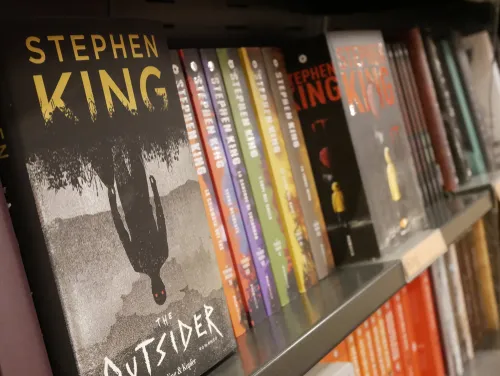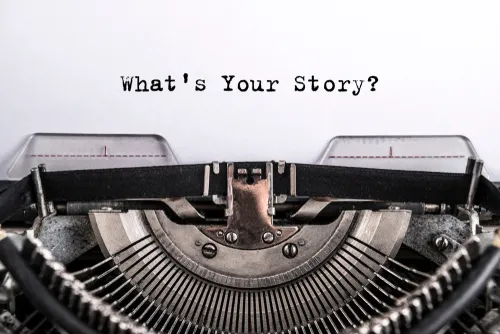

The Road to Happiness is Paved With Positive Storytelling
The year was 1970, Stephen had just graduated from college with a degree in English, but couldn’t get the job he wanted. He had to work at a petrol station and at a laundry store instead.
Stephen always dreamt of being a published novelist, but he kept on receiving rejections for his submissions. In fact, he used to pin all the rejection letters he received on a nail on his wall. When the rejection letters became too heavy for the nail, Stephen replaced it with a stronger spike.
In 1971, Stephen was quite hopeful about getting his novel published by a large global publisher. His hopes and dreams, however, were shattered again; the publishing company refused to go ahead with his novel as it had recently published a novel in the same genre.
By 1972, Stephen, his wife, and his two children, were living in a small mobile home, a trailer, in a small town. The family was barely making ends meet, but Stephen kept on writing.
This sounds like a sorrowful story, an unhappy tale that is melancholic and gloomy. But what if I told you that the protagonist of this story is none other than one of the world’s most acclaimed and successful authors – Stephen King!

Let’s face it, the Covid-19 outbreak means that we’re living in difficult times. The fear and worry attached to the Coronavirus pandemic has taken an emotional toll on us. We all can, in some slight way or the other, relate to how Stephen King was feeling in 1972. We’re a little, or a lot, stressed. We’re a little, or a lot, anxious.
What’s more important to remember is that Stephen King kept writing his stories. As a matter of fact, in his biography titled ‘On Writing: A Memoir of the Craft’, King states:
“I feel that buzz of happiness, that sense of having found the right words and put them in a line. It's like lifting off in an airplane: you're on the ground, on the ground, on the ground... and then you're up, riding on a magical cushion of air and prince of all you survey.”
One of the magic tricks that the age-old art of storytelling can perform is that it can radiate happiness. Writing our own stories in a positive way can bring smiles to our faces and songs to our hearts. A study conducted by The University of Zurich focused on the effect of biographical stories on people. The study concluded that life-review and structured biographical narratives can help in improving quality of life.

Just like we control our physical actions and wash our hands frequently, stay indoors, or practice social distancing, similarly we can control the narrative of our own lives. Emily Esfahani Smith, a writer who bases her work on psychology, literature, and philosophy, suggests that when we make narratives from the events of our lives, we provide clarity to ourselves on who we are and what we need to do. The act of biographical storytelling can help people understand themselves better and make sense of their lives. Therefore, we should craft our current life stories constructively, and keep on telling, and retelling, these stories in more positive ways.
This positive spin on our own narratives makes our lives feel more meaningful and provides us with a strong sense of happiness. Shawn Anchor, a famous positive psychologist, states that we need to change the way our brain perceives the world around us, and create optimistic stories of our lives.

There are various ways in which we can retrain our brain to create happy stories. We can avoid the negatives in our lives and strongly focus on the good things that happen every day. We may be spending more quality time with the family, we may be cooking new dishes, we may be reading more, or we may be spending more time doing yoga. There must be something we’re doing these days that we regard higher than our usual rat race, and we should use that as a strong positive in our personal story.
Being grateful for what we have is another way to add positive notes to our stories. A 'gratitude condition' leads to increased positivity and optimism. Also, acts of kindness, like helping the poor and needy in these troubled times, make us happy – more happier than when we buy something for ourselves! Therefore, do kind deeds and fill your personal stories with them.
“Writing is not life, but I think that sometimes it can be a way back to life,” states Stephen King. So, start creating your personal positive story today – you’ll be paving the way to your happiness.
Additional References / Further Reading:
- 'On Writing: A Memoir of the Craft' by Stephen King
- 'Today's Writers and Their Works: Stephen King' by Rebecca Stefoff
- 'Narratives of Life: Storytelling in the Perspective of Happiness and Disaster' by Geneviève Grimm and Brigitte Boothe in Journal of Aging Humanities and the Arts Humanities
- 'How Gratitude Leads to a Happier Life' by Melanie Greenberg in Psychology Today
- 'Kindness Makes You Happy… and Happiness Makes You Kind' by Alex Dixon in Greater Good Magazine





